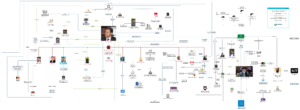
Programmatic Services and Tools
Summary
Lorem ipsum dolor sit amet, consectetur adipiscing elit. Ut elit tellus, luctus nec ullamcorper mattis, pulvinar dapibus leo.
Programmatic Services and Tools
Founded on the belief that endemic corruption can be ameliorated by transforming systems into bulwarks that deter corrupt practices and promote accountability, Systems Integrity Development (SID) is a pragmatic, holistic, and proactive set of proprietary tools to reduce systemic corruption by addressing internal control weakness and human factor deficiencies within an organization. The following SID tools are tailored to each specific context and can be conducted independently:
- Systems Integrity Assessment
UNISHKA extensively maps the current operational system, engaging all key stakeholders involved in identifying corruption risks and weaknesses and consolidating information for analysis.
- Human Factor Analysis
UNISHKA understands corruption risks in a system using human factor aspects including behavior, values, skills, and motivations, and recommends solutions to address them.
- Process Mapping
UNISHKA employs this methodical and visual tool to understand and illustrate the workflow in a given system, identify nodes of corruption using flow diagrams and ways to eliminate them.
- Network Link Charts
UNISHKA conducts visual analysis on the external operational linkages of a given organization, establishing institutional connections and relationships that create nodes of corruption and demonstrate the extent of collusions.
- Vulnerable Populations Assessment
In accordance with its commitments under the United Nations Global Compact, UNISHKA analyzes how corruption effects vulnerable populations including gender, ethnic minorities, religious minorities, persons with
disabilities, LGBTQI and others, promoting equitable treatment.
- Technical Capacity Assessment
UNISHKA assesses the individual competencies of personnel within an organization as they relate to job performance. We then make recommendations for professional training to transform the individual into more responsible and accountable agents within the system.
- Infrastructure Capacity Assessment
UNISHKA assesses workplace infrastructure, facilities, and equipment as it effects the organizations’ ability to fulfill their legal responsibilities. We then make recommendations to improve the efficiency and effectiveness of the work environment.
- Organizational Capacity Assessment
UNISHKA conducts broad-based evaluations of the organizations’ strengths and weaknesses with particular focus on internal governance, identifies issues that impact transparency and accountability, and recommends solutions for improvement.
- Standard Operating Procedures
UNIHSKA establishes clear and precise sets of instructions for actors within given organizations to ensure transparent and accountable compliance in operational processes. This is completed in conjunction with our process mapping.
- Operations Manual
UNISHKA streamlines and customizes manuals of operation to enable given organizations to perform more efficiently and effectively guided by the general principles of integrity, transparency and accountability. Each manual includes: gathering of facts, activity documentation, workflow diagraming and analysis, support systems assessment, process modeling, process improvement opportunities, support system enhancement, and recommendations.
UNISHKA offers courses on anti-corruption and a wide variety of topics to educate scholars, practitioners and activists on the science and practice of anti-corruption.
- Anti-Corruption Principles and Practices
UNISHKA offers a 1-2 week fundamental course on anti-corruption that covers science and theories as well as practical information that every anti-corruption advocate, specialist or activist should know and understand. Topics include but not limited to history, causes, effects and manifestations of corruption; policy and strategy, anti-corruption agencies, activism, and international resources.
- Anti-Corruption Thematic Training
UNISHKA offers a 1-week customized training and courses on anti-corruption as it relates to specific sectors, taught by international sectoral experts e.g., gender education, health, sports, environment, elections, etc.
- OSINT Training for Media and Activists
UNISHKA offers a special foundational training course designed specifically on open-source intelligence (OSINT) to teach media practitioners and activists how to use the internet to collect and analyze data that can be used to investigate corruption and other illicit activities.
- Compliance Systems Training for Corporations
Businesses and organizations risk reputational damage, major losses, sanctions, penalties, suspension and even bankruptcy for certain regulatory violations. UNISHKA offers customized training to help institutions and corporations comply with both internal and external rules and regulations and ensure both management and concerned employees are knowledgeable and responsible in enforcing applicable laws, rules, and regulations.
- Cooperation with Law Enforcement Agencies
Grand corruption cases (e.g., money-laundering) are often complex and transnational in nature, and thus, requires collective efforts across international agencies. These entail collaboration among the police, customs, national security services, crime and anti-corruption agencies and border guards on cross-cutting law-enforcement issues such as information/intelligence sharing, analysis, investigations and even asset recovery. UNISHKA provides training/briefing on bilateral and multilateral frameworks and avenues to equip institutions with knowledge and skills to address transnational corruption cases.
- Forensic Auditing Training
UNISHKA offers a special foundational training course designed specifically on open-source intelligence (OSINT) to teach media practitioners and activists how to use the internet to collect and analyze data that can be used to investigate corruption and other illicit activities.
- Anti-Bribery/Understanding Corruption on the Supply and Demand Side Training
UNISHKA offers a special foundational training course designed specifically on
open-source intelligence (OSINT) to teach media practitioners and activists how to use the internet to collect and analyze data that can be used to investigate corruption and other illicit activities.


 *click to enlarge
*click to enlarge *click to enlarge
*click to enlarge